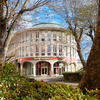Temple Japan offers a specialized spring semester architecture program for students majoring in architecture, architectural studies, and urban design/studies. The program is designed to introduce you to the world of Japanese architecture – its history, traditions and influences, as well as its highly unique contemporary forms, challenges, practices and innovations. Beginning in Spring 2025, this program will be hosted in Kyoto.
Japan possesses one of the most exciting architectural landscapes in the world, encompassing exquisite wooden temples, minuscule micro-houses and futuristic skyscrapers on seismic fault lines. Yet Japan is also facing unprecedented architectural challenges; such as the rebuilding of Tohoku, rapidly changing demographics, global economic uncertainty and ever-increasing issues related to the environment and sustainability. What Japan does next in terms of the built environment and urban planning will be watched by architects worldwide.

